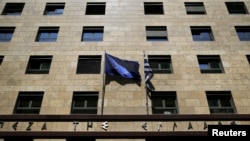The Greek central bank has warned that failure to reach a bailout deal with its international creditors will result in recession, decline in income levels, and possibly even a withdrawal from the Eurozone.
The central bank issued its statement Wednesday, a day before Eurozone finance ministers meet to discuss how to get more emergency funds to Greece by June 30, when Athens is obligated to pay back $1.8 billion to the International Monetary Fund.
In its statement Wednesday the bank said a default on that payment could set off a chain of events that might even lead to Greece dropping out of the common European currency used by 18 of its neighbors.
The President of the Athens Chamber of Commerce Constantinos Michalos urged all sides to act sensibly and find a mutually beneficial agreement.
"Greece is at an extremely critical stage at the moment, we are looking for a mutually beneficial agreement with our partners and lenders. However if there is a rift, then it could be catastrophic for the Greek economy and it would be a modern Greek tragedy in the making," said Michalos.
At a joint news conference after a meeting with Austrian Chancellor Werner Faymann Wednesday in Athens, Greek Prime Minister Alexis Tsipras praised his guest for understanding that “without social cohesion and growth, and only with tough austerity, Europe cannot overcome the crisis.”
Faymann said that “there is no sense in horizontal cuts... we must find solutions that do not further expand poverty and unemployment."
Eurozone President Jeroen Dijsselbloem said Wednesday that a deal between Greece and its creditors is "still possible," but “it is up to the Greeks to present a number of … alternative proposals.”
The 19 Eurozone finance ministers are to meet in Luxembourg Thursday to make a crucial decision on the Greek bailout, as the end of June deadline for Athens to repay about $1.8 billion in debt approaches.
Economic reform talks with international lenders in Brussels collapsed last Sunday, leaving Greece closer than ever to default.
Reports say the negotiations between Greece and the IMF fell apart in less than an hour, with both sides blaming the other.
The banks are demanding that Greece carry out additional economic reforms, including more pension cuts and tax increases.
The Greek government says it already has made enough sacrifices, saying the living standard for Greeks has fallen while unemployment climbed.
European finance officials say Greece's economic reform proposals are incomplete and say they are losing patience with Athens.





